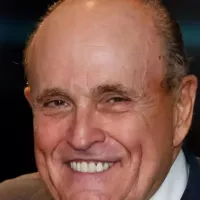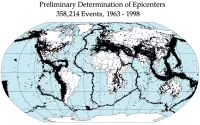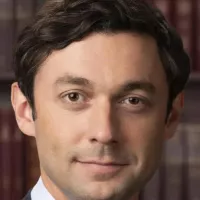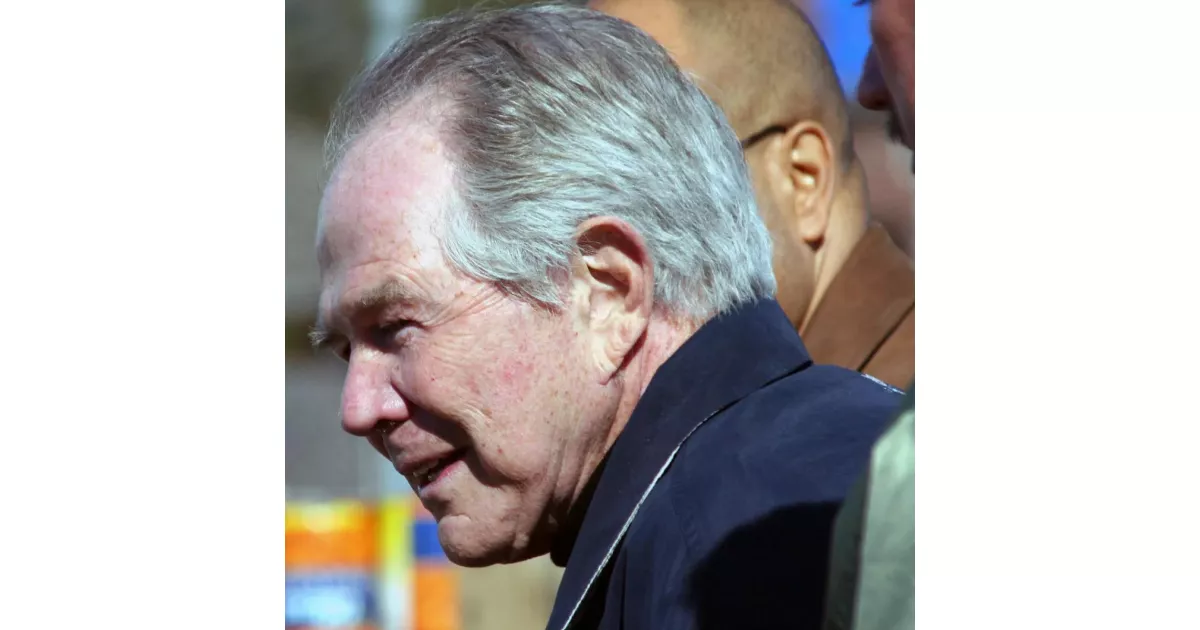Controversies are a part of history. Explore the biggest scandals linked to Pat Robertson.
Pat Robertson was a prominent American televangelist, media mogul, and political commentator. He founded the Christian Broadcasting Network (CBN) and Regent University, advocating for a conservative Christian worldview. Robertson ran for president in 1988, demonstrating his active involvement in Republican politics and his influence within the Christian right. He was a key figure in the Charismatic movement and a significant voice in American religious and political discourse for decades.
March 1986: Statement on South Africa
In March 1986, Pat Robertson told Israeli Foreign Affairs that South Africa was a major contributor to the Reagan administration's efforts to help the anti-Sandinista forces.
1986: McCloskey Challenges Robertson's Military Record
In 1986, former Republican Congressman Paul "Pete" McCloskey Jr. challenged Pat Robertson's military record, leading to a libel suit.
1990: Christian Coalition Sued by FEC
In 1990, the Christian Coalition, started by Robertson, was sued by the Federal Election Commission for coordinating activities with Republican candidates.
1991: Controversy Surrounding "The New World Order"
In 1991, Pat Robertson faced controversy over his book "The New World Order", with critics like Michael Land and Jacob Heilbrun accusing him of propagating theories about a worldwide Jewish conspiracy and borrowing from anti-Semitic works.
1992: Christian Coalition Sued by FEC
In 1992, the Christian Coalition, started by Robertson, was sued by the Federal Election Commission for coordinating activities with Republican candidates.
1994: Coalition Fined for Improper Aid
In 1994, the Christian Coalition was fined for improperly aiding Representative Newt Gingrich and Oliver North.
1994: Christian Coalition Sued by FEC
In 1994, the Christian Coalition, started by Robertson, was sued by the Federal Election Commission for coordinating activities with Republican candidates.
June 2, 1999: Allegations of Business Dealings with Charles Taylor
On June 2, 1999, The Virginian-Pilot alleged that Pat Robertson had business dealings with Liberian president Charles Taylor, which Robertson denied.
1999: Failed Venture with Bank of Scotland
In 1999, Pat Robertson's joint venture with the Bank of Scotland to provide financial services in the US fell through due to criticism over Robertson's views on homosexuality.
1999: Allegations Against Operation Blessing
In 1999, The Virginian-Pilot published an article alleging that Operation Blessing's planes were used to haul diamond-mining equipment to Robertson's mines in Zaire.
September 11, 2001: Controversial Comments on 9/11 Attacks
During the week of September 11, 2001, Pat Robertson interviewed Jerry Falwell, who stated that the ACLU, pagans, abortionists, feminists, gays, and lesbians were to blame for the terror attacks of September 11th. Robertson replied, "I totally concur". These comments were met with serious criticism, including from President George W. Bush.
October 2003: Criticism of the State Department
In October 2003, Pat Robertson was interviewed about the book 'Dangerous Diplomacy' and suggested that to change American diplomacy, a large part of the United States Department of State should be eliminated.
September 12, 2005: Hurricane Katrina Comments
On the September 12, 2005, broadcast of The 700 Club, Pat Robertson implied that Hurricane Katrina was God's punishment for America's abortion policy. He suggested a connection between the September 11 attacks and the disaster in New Orleans.
November 7, 2007: Endorsement of Rudy Giuliani
On November 7, 2007, Pat Robertson announced his endorsement of Rudy Giuliani for the 2008 Presidential election.
January 2009: Opposition to Division of Jerusalem
In January 2009, Pat Robertson voiced strong opposition to dividing Jerusalem between Israel and the Palestinians. He stated that Armageddon would be the "battle of Jerusalem," with global forces attempting to seize it from the Jews. Robertson emphasized Jerusalem's "spiritual symbol" and cautioned against relinquishing it.
2009: Comments on Islam
In 2009, Pat Robertson described Islam as "a violent political system bent on the overthrow of the governments of the world and world domination." He advocated treating it as a political system similar to the communist party or a fascist group.
February 4, 2010: Charles Taylor's Testimony
On February 4, 2010, at his war crimes trial, Charles Taylor testified that Pat Robertson was his main political ally in the U.S., which Robertson denied.
2010: Haiti Earthquake Comments
In 2010, Pat Robertson's response to the Haiti earthquake sparked widespread condemnation. He claimed that Haiti's founders had sworn a "pact to the Devil" and attributed the earthquake to the Haitian people being "cursed" for doing so. CBN later clarified that Robertson's comments were based on the 1791 slave rebellion and a supposed pact with the devil in exchange for victory over the French.
2014: Reversal on Cannabis Legalization
In 2014, Pat Robertson reversed his stance on cannabis legalization. He cited concerns about protecting children, claiming higher cannabis use rates in Colorado after legalization, contrasting with his earlier advocacy for treating cannabis similarly to alcohol and tobacco.
March 2015: Comments on Buddhism
In March 2015, Pat Robertson compared Buddhism to a disease on The 700 Club. The American Center for Law and Justice (ACLJ), a conservative Christian watchdog group Robertson founded, called for a multi-pronged attack on mindfulness programs because "they appear to be similar to Buddhist religious practices."
Mentioned in this timeline

George W Bush the rd U S President - is...

Rudy Giuliani is an American politician and disbarred lawyer best...
Africa is the second-largest and second-most populous continent comprising of...

The Korean War - was a conflict between North Korea...
Pennsylvania is a U S state located in the Mid-Atlantic...

An earthquake is the shaking of the Earth's surface caused...
Trending

2 hours ago Maya Hawke and Christian Lee Hutson celebrated wedding with Stranger Things cast present.
2 hours ago Wizz Air Launches New Larnaka-Barcelona Flights, Boosting Tourism for Cyprus and Spain.

2 hours ago Jon Ossoff criticizes Trump, speech goes viral, fueling 2028 'Front Runner' speculation.
4 hours ago ANTM's controversies are revealed in a new Netflix documentary, with Tyra Banks facing criticism.
4 hours ago EU monitors Albania's legal changes: Concerns raised over Rama's SPAK amendment.
5 hours ago Arkansas State Police sees 29% drop in high-speed pursuits due to law changes.
Popular

Jesse Jackson is an American civil rights activist politician and...
Randall Adam Fine is an American politician a Republican who...

Pam Bondi is an American attorney lobbyist and politician currently...

Barack Obama the th U S President - was the...

Martin Luther King Jr was a pivotal leader in the...

Ken Paxton is an American politician and lawyer serving as...
